- Home
- Ann M. Martin
Claudia's Friend Page 3
Claudia's Friend Read online
Page 3
She sat down next to me and pulled the books toward her.
“Ah, Stace? What are we doing in the kitchen, exactly?”
“We’re here because there are too many distractions in your room. And what I just did, as I think you guessed by your little comment about the stove clock, was to remove all distractions here in the kitchen.”
“Geez, Stacey. We’re going to study! Not write a Newbery award book.”
Stacey raised her eyebrows. (She looked very New York, if you know what I mean.) “This is just as important,” she said. “Or it should be, to you.”
Wow. I didn’t know what to say. It didn’t matter. Stacey obviously wasn’t expecting me to disagree.
Stacey flipped open the English book. “Use the following words as modifiers in a complete sentence,” she read aloud.
I won’t say time went by quickly. I personally think it is twice as hard to study without a clock to watch. And I personally was sick of the “following words” as modifiers or as anything else by the time we finished my homework. But Stacey wasn’t.
I admit it, my mouth dropped open when she pulled a neat package of 3 × 5 index cards out of her bag.
“What are those?” I said.
“Flash cards,” she announced. “Or they will be.”
“Flash cards. Like little kids use?”
“Like anybody uses to help with her spelling,” Stacey told me. “Here. Write each word on a card and we’ll go through them a few times.”
“A few times?” I said. My voice rose.
“Claudia, do you want to pass this test, or don’t you?”
I sighed a little sigh. I looked around the kitchen. No clocks. No radios. No telephones. It was like a weird art piece. I wondered if I could do something with it somehow. Maybe …
“Claudia!”
I pulled the cards toward me and began to write.
My father got home just as we were finishing.
“Hello Stacey, Claudia. Working hard?”
“Yes,” I said. I tried not to sound glum about it.
“Good,” said my father. He disappeared in the direction of the den and I looked at the stack of cards.
“Again?” I said.
“No, that’s enough for today,” replied Stacey. “You don’t want to be too tired to do your other homework.”
“Gee, thanks,” I said.
Folding her arms, Stacey gave me a Look. “Claudia, this is serious. Do you remember what happened the last time your schoolwork took a slide? Do you?”
“I guess so,” I said.
“Like your parents saying you’d have to quit the Baby-sitters Club?”
“I know.” I felt guilty then, for giving Stacey any grief at all. “I’m sorry, Stace. I don’t know. Somehow complaining seems to make things easier.”
Stacey’s face relaxed into a grin. She began gathering up her notebooks and books and pens. “I know, I know. Kvetching.”
“Kvetching?”
“It’s Yiddish. And New Yorkish … it means complaining as an art form.”
“Kvetching.” I tried the word out again. It sounded just like what it was. “I like that.”
“I have to go,” Stacey said.
“Thanks a lot, Stace. I really appreciate this.”
“Until next time, then.”
“Until next time,” I echoed.
“Right. Meanwhile, keep going over those words.”
“Yes, ma’am!” I said.
I walked Stacey to the door, then went back to my room. My brain felt like mush, but I’d had an idea about those flash cards. If I had to look at them over and over, at least I could make them better to look at. In my room, I cleared off my desk, then spread the cards out on one side of it and my colored pencils on the other.
“Embarrass,” was the first card. That was easy. The card deserved a red theme because when I get embarrassed my face turns red.
By the time dinner was ready, I’d decorated most of the vocabulary cards with the colored pencils. I was actually enjoying myself.
I must have looked pretty pleased when I sat down at the table. Janine finished unfolding her napkin and then said to me, “You appear to be in remarkably salubrious spirits, considering your situation.”
“Are you talking about the tutoring?” I asked.
“I was referring to your coursework review, yes.”
“Oh, I’m not kvetching,” I said airily.
Janine’s eyes widened, and I burst out laughing.
I decided I’d better ask Stacey how to spell “kvetching.” It was possibly my new favorite word.
After school on Wednesday Mary Anne reached the Rodowskys’ as soon as she could, which meant she was a little early. She wanted to make sure she had a chance to talk to Mrs. Rodowsky first. It was a good thing she did give herself that extra time, because Mrs. Rodowsky had quite a bit she wanted to tell Mary Anne.
They went into the den and Mrs. Rodowsky closed the door behind her.
“I want to explain to you what Shea has been through,” she told Mary Anne.
Mary Anne was relieved. She had a lot of questions, but she wasn’t quite sure where to start. She was glad Mrs. Rodowsky was going to begin.
Folding her hands in her lap, Mrs. Rodowsky said, “Shea has always had trouble in school. But just recently we realized that he might have a specific learning disorder. When we did realize that, Shea had to go through a number of tests to determine if that was the problem.”
“What kind of tests?” asked MaryAnne.
“He’s been evaluated by neurologists, eye doctors, hearing specialists, reading disorder specialists, reading disorder counselors, and special educators. A number of things had to be ruled out, you see.”
“Oh,” said Mary Anne.
“Once we had ruled out all the other possibilities, we realized that what Shea has is dyslexia. You may have heard of that before.”
“I have, but I’m not sure what it means.”
“It’s a pretty broad term. In Shea’s case, it means he has problems recognizing letters and words, and sometimes numbers, on the printed page. He reverses letters, like ‘b’ for ‘d’ and words, like ‘was’ for ‘saw.’ He might see a ‘6’ as a ‘9.’ Very young children do this when they are just learning to read. But for some children, it persists even after they are older.”
Mary Anne said thoughtfully, “Shea must have had to work twice as hard, just to keep up.”
Mrs. Rodowsky leaned forward and put her hand on Mary Anne’s. “Yes!” she said. “In a lot of ways, he’s had to be twice as smart. Unfortunately, he doesn’t feel that way. The tests show Shea is above average in intelligence. But with all these tests and tutoring, he’s convinced himself he’s just the opposite. He … he calls himself a ‘dummy.’ ”
“But he’s not,” said Mary Anne.
“That’s where I’m hoping you can help. You’re closer to Shea in age. Maybe he won’t feel so pressured if he’s working with you. He’s so suspicious now of us adults and all our tests …” Mrs. Rodowsky shook her head. “Maybe you can help.”
An enormous crash from the kitchen brought both Mrs. Rodowsky and Mary Anne to their feet.
“Jackie!” exclaimed Mary Anne. Then she looked quickly at Mrs. Rodowsky, hoping she hadn’t hurt her feelings by assuming the crash had been caused by Jackie (also known among his baby-sitters as the Walking Disaster).
But Mrs. Rodowsky wasn’t fazed. “Jackie,” she agreed. “Shea’s in his room. Why don’t you go join him?”
So instead of hurrying to see what Jackie had crashed into, knocked down, fallen on, or tripped over, Mary Anne went to Shea’s room.
Shea was hunched over his desk, his hands balled up into fists and dug into his cheeks. Lopsided stacks of books and ragged-edged piles of papers covered the surface. Shea wasn’t looking down at them, though. He was staring out the window above the desk.
Mary Anne stepped inside the open door and said, “Shea?”
Shea h
alf turned his head without moving the rest of his body. “Yeah?”
“It’s me. Mary Anne.”
“Hi, Mary Anne.” Shea didn’t sound very enthusiastic.
Mary Anne walked into the room and said, “Do you mind if I pull up a chair?”
“Okay,” said Shea. His level of enthusiasm didn’t change.
“What are you working on?” asked Mary Anne.
Shea unballed his fists and waved his hands, as if he wanted to shoo the question away. “Homework.”
“Which homework? Math? Geography? English?”
Shea made the same gesture, with an added sort of hopelessness in it. “I dunno.”
“Okay. Why don’t you see what your homework is, and then decide what you want to work on?”
“That’s what Mrs. Danvers said to do,” Shea said. “She’s my teacher. She said I should make a list of my homework assignments and the books I’ll need.”
Mary Anne nodded. “Sometimes even making a list is a pain, but that sounds like a good idea.” She eyed the chaos on his desk and said, “Okay, for a start, what are your subjects in school?”
Shea told Mary Anne what his subjects were. Then they made a list of the subjects for which Shea had homework assignments that night. Beside each assignment, they wrote down everything Shea would need for it: books, notebooks, notes, handouts, pens, pencils, paper, whatever.
Then, finally, they started on the homework.
“For English,” Mary Anne said, studying the list, “you’re supposed to write a letter to someone you admire.”
Shea frowned.
“Anybody you admire,” said Mary Anne. “Who’s your favorite … athlete?”
Shea shrugged. Then he said, “I like Jackie Robinson. He was a hero.”
“I think Jackie Robinson is, ah, dead, Shea.”
“My teacher didn’t say we had to write to a live person.”
“True,” said Mary Anne. “Okay, why don’t you write to Jackie Robinson. What do you need?”
“A pencil and some paper,” said Shea, grabbing his pencil and pulling a sheet of paper toward him. “First we write our name and address and the date in the right hand corner.”
He bent his head, started to write in the left corner, erased, moved to the right, then back to the left, and finally settled on the right. He wrote laboriously. “Then we write the person’s name and address below that.” He wrote for a minute longer, then said, “What address do I use for Jackie Robinson?”
Where do you send a letter to a dead person? Mary Anne wondered. Then she remembered that Jackie Robinson had played for the Dodgers. “You could send it in care of the Dodgers. In Los Angeles,” she suggested.
“Okay.”
For a long time after that the room was quiet as Shea wrote and erased and wrote some more. Finally he looked up. “Here,” he said. He handed Mary Anne his letter.
“It’s a good letter, Shea,” Mary Anne said. “But I think it needs a little more work.”
Shea threw down his pencil. “It’s all wrong, isn’t it. I can’t do anything right.”
“That’s not true,” began Mary Anne.
“It is, too,” said Shea. “I’m stupid and dumb and dopey.”
“No, you’re not!”
Shea didn’t look convinced. “If I’m not, how come my letter’s not right?”
“Nobody’s perfect,” said Mary Anne. “You’re better at some things than others, so you have to work harder on some things.”
“I’m dyslexic,” said Shea bitterly. “That means I’m dumb.”
“It means you learn things differently from most other people. It does not mean you’re dumb.”
Shea folded his arms and scowled.
“Come on,” said Mary Anne. “We’ll make this letter perfect. But to make something perfect, you have to make some changes, sometimes. Mostly you just need to fix your spelling.”
At last Mary Anne persuaded Shea to work on the letter. And bit by bit, he got it right.
A funny thing happened while they were working, though. Mary Anne kept getting the feeling she was being watched. And sure enough, once when she turned around, Jackie and Archie were standing in the doorway of Shea’s room.
“Hello,” said Mary Anne.
“Hi,” said Jackie.
“Hi,” said Archie.
“We’re working right now,” Mary Anne told them.
“We know,” said Jackie. He grinned his jack-o’-lantern grin. With his red hair (all the Rodowsky boys have red hair) he even looked sort of Halloween-y in a cheerful way.
Mary Anne turned back to Shea.
A few minutes later she looked over her shoulder. Jackie and Archie were still there. Jackie leaned over and whispered something to Archie and they both grinned.
Were they laughing at Shea? Mary Anne didn’t think so. Jackie was a Walking Disaster, but he was a good person.
“Jackie, Archie? Can I do something for you?”
“No,” said Archie.
“No,” said Jackie. They both just kept grinning.
“Fine, we’ll keep working then.” Mary Anne turned back to the desk again. A moment later she turned around. Jackie and Archie were still there.
“Good-bye,” said Mary Anne firmly.
“Oh!” said Jackie. “Good-bye.”
“ ’Bye,” said Archie.
Reluctantly, the two of them slid away. A few minutes later she heard Archie shriek, “Look out!” from the back of the house and she knew he and Jackie had found something else to occupy them.
Mary Anne decided the boys must have been jealous because Shea had her undivided attention. Or maybe they were confused because Mary Anne had switched from baby-sitter to tutor.
“It’s a good letter,” said Mary Anne at last. It was a little smudged, but spelling-wise, it was perfect. “An excellent letter.”
Shea took it and carefully put it between the pages of his English notebook. “I guess.”
Looking at her watch, Mary Anne said, “Uh-oh. I’d better go. It’s almost time for my Baby-sitters Club meeting.”
She thought Shea would ask her questions about the meeting, or say something. But he didn’t.
His head sank onto his fists. He stared out the window. “Okay,” he said.
“You did good work, Shea.”
“Sure.”
Mary Anne paused. She didn’t know what else to say. “Well, ’bye,” she said at last.
“Good-bye,” said Shea softly. He sounded as discouraged and sad as he looked.
“Baby-sitters Club,” Jessi answered the phone crisply. She wedged the receiver between her ear and her shoulder, grabbed a pencil with one hand and her notebook with the other, and began to scribble down information.
It was Wednesday afternoon and business as usual. In fact, maybe a little more business than usual.
I’d already taken one job, and that was all I was going to allow myself with the test coming up. Jessi hung up and I watched as Mary Anne flipped through the book to schedule the appointment.
“You can just write down ‘studying’ for me for every afternoon, evening, and weekend,” I said mournfully.
“In between your art lessons and the BSC meetings?” asked Mary Anne innocently.
Mallory gave me a poke with her elbow and I grimaced. Mary Anne finished logging in the latest job and then said, “You know, I was with Shea Rodowsky this afternoon.”
“That’s right,” said Jessi. “How did that go?”
Mary Anne grimaced. “I’m not really sure. I talked to Mrs. Rodowsky first and she explained more about dyslexia.”
“You know, I just remembered,” said Dawn. “A friend of mine in California has dyslexia. I remember she was a real brain. She could figure out how anything worked. But she had trouble reading basic instructions.”
“What happened to her?” asked Kristy.
“Nothing.” Dawn looked surprised. “She took some special classes for awhile, and she started tape recording all her regula
r classes because she took notes so slowly. She was building a sailboat when I left. Said she was going to finish it in time for high school graduation, then sail around the world.”
“I wish Shea could meet your friend, Dawn,” said Mary Anne. “He thinks he’s stupid and hopeless and dumb. Dopey, that’s what he called himself.”
“Shea’s not dumb!” said Stacey indignantly. “Anybody who’s spent any time with him would know that.”
“That’s right. In fact, his mother told me he’s above average in intelligence.”
“What does dyslexia mean, anyway?” asked Mallory.
“It’s a learning disability, or learning difference,” Mary Anne replied. “A dyslexic person doesn’t see things the same way other people do. He reverses letters or words. He might read ‘was’ for ‘saw.’ He doesn’t even know he’s doing it. He just knows he’s not keeping up with everyone else in his class. So he figures he’s dumb.”
“Wow, scary,” said Mallory.
“It must be, a little,” said Mary Anne.
“But now that the Rodowskys know what the problem is, they can deal with it, right?” That was Kristy, of course.
“I’m not sure it’s that easy,” Mary Anne replied.
“I didn’t mean it was easy,” said Kristy. “I just meant that they have a solution to the problem.”
“Yes. But knowing what the problem is, and knowing how to correct it, isn’t making Shea feel any better. And I’m not sure what we can do.”
“Give him lots of praise and encouragement,” suggested Jessi.
Mary Anne nodded. “That’s a good idea. But it has to be genuine, or Shea’s going to think we’re just trying to make him feel better.”
“True,” said Kristy. “And that would be even worse.”
“Like when you give a really lousy dance performance,” Jessi said, “and everyone says how wonderful you are. You feel fifty times worse than if someone said something a little more truthful …”
“Like you were awful?” Mallory raised her eyebrows at Jessi.
“No! Just something more truthful. I don’t know. Like, this part of the performance looked good, but that part needed work.”
“It depends on who’s saying it, too, don’t you think?” asked Dawn.
Mary Anne said, “But what about …”

 Karen's Tea Party
Karen's Tea Party Kristy and the Snobs
Kristy and the Snobs Best Kept Secret
Best Kept Secret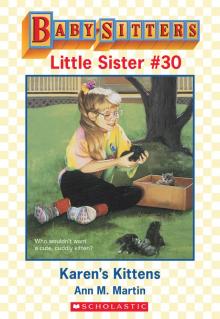 Karen's Kittens
Karen's Kittens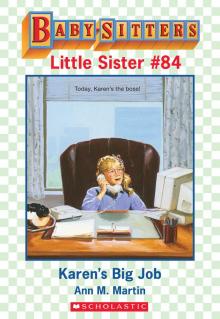 Karen's Big Job
Karen's Big Job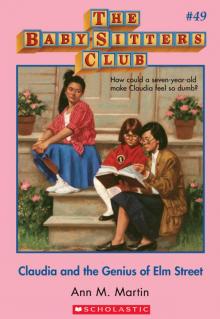 Claudia and the Genius of Elm Street
Claudia and the Genius of Elm Street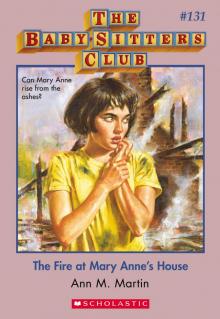 The Fire at Mary Anne's House
The Fire at Mary Anne's House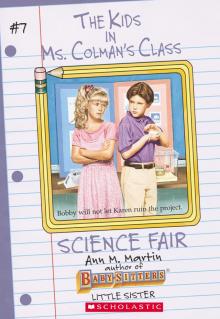 Science Fair
Science Fair Me and Katie (The Pest)
Me and Katie (The Pest)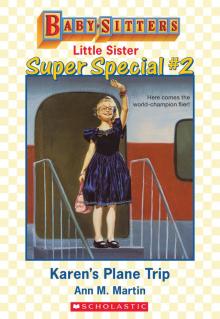 Karen's Plane Trip
Karen's Plane Trip Jessi's Wish
Jessi's Wish Dawn and Too Many Sitters
Dawn and Too Many Sitters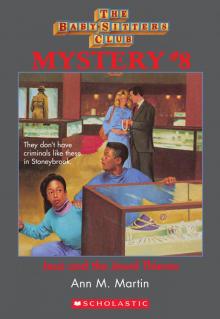 Jessi and the Jewel Thieves
Jessi and the Jewel Thieves Eleven Kids, One Summer
Eleven Kids, One Summer Karen's Goldfish
Karen's Goldfish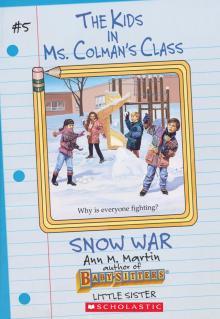 Snow War
Snow War Abby and the Secret Society
Abby and the Secret Society Keeping Secrets
Keeping Secrets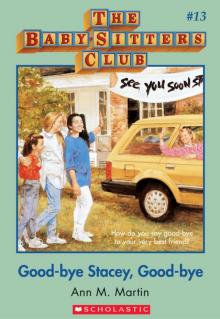 Good-Bye Stacey, Good-Bye
Good-Bye Stacey, Good-Bye Karen's Sleepover
Karen's Sleepover Claudia and the World's Cutest Baby
Claudia and the World's Cutest Baby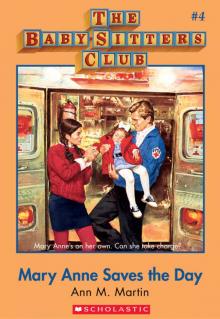 Mary Anne Saves the Day
Mary Anne Saves the Day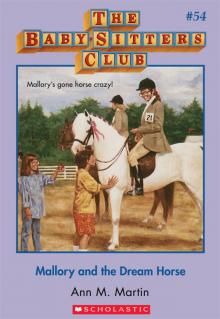 Mallory and the Dream Horse
Mallory and the Dream Horse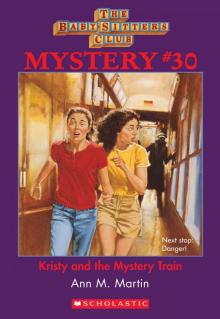 Kristy and the Mystery Train
Kristy and the Mystery Train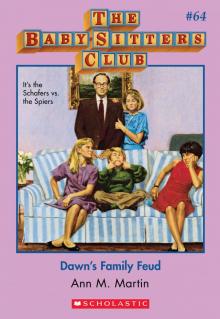 Dawn's Family Feud
Dawn's Family Feud Karen's Twin
Karen's Twin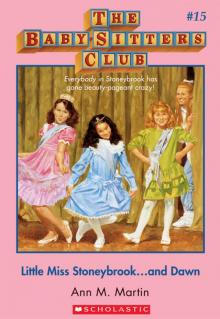 Little Miss Stoneybrook... And Dawn
Little Miss Stoneybrook... And Dawn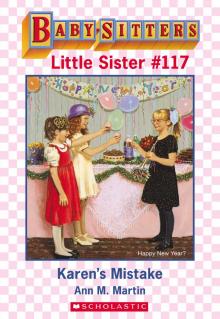 Karen's Mistake
Karen's Mistake Karen's Movie Star
Karen's Movie Star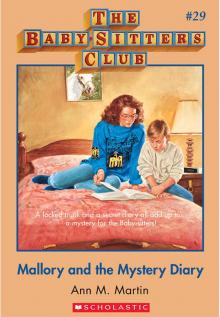 Mallory and the Mystery Diary
Mallory and the Mystery Diary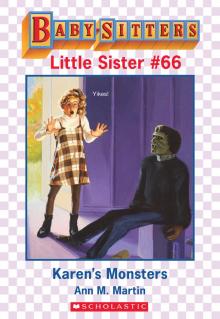 Karen's Monsters
Karen's Monsters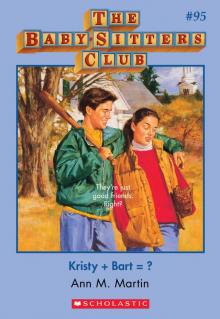 Kristy + Bart = ?
Kristy + Bart = ?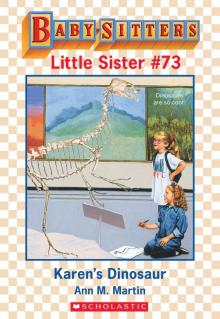 Karen's Dinosaur
Karen's Dinosaur Here Today
Here Today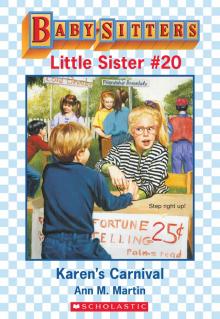 Karen's Carnival
Karen's Carnival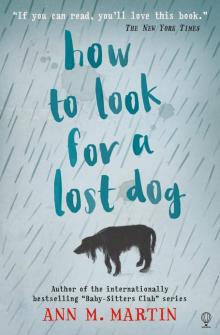 How to Look for a Lost Dog
How to Look for a Lost Dog Stacey vs. Claudia
Stacey vs. Claudia Stacey's Ex-Boyfriend
Stacey's Ex-Boyfriend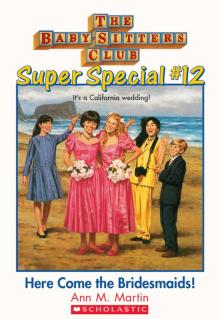 Here Come the Bridesmaids!
Here Come the Bridesmaids! Graduation Day
Graduation Day Kristy's Big News
Kristy's Big News Karen's School Surprise
Karen's School Surprise Kristy Thomas, Dog Trainer
Kristy Thomas, Dog Trainer Baby-Sitters' Christmas Chiller
Baby-Sitters' Christmas Chiller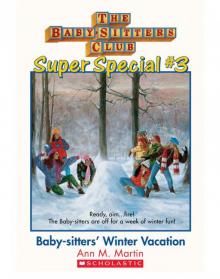 Baby-Sitters' Winter Vacation
Baby-Sitters' Winter Vacation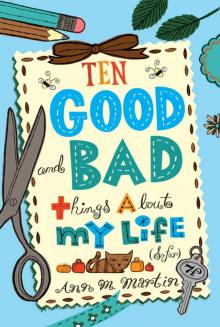 Ten Good and Bad Things About My Life
Ten Good and Bad Things About My Life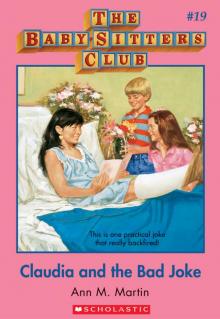 Claudia and the Bad Joke
Claudia and the Bad Joke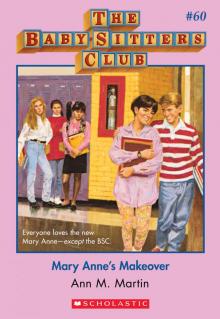 Mary Anne's Makeover
Mary Anne's Makeover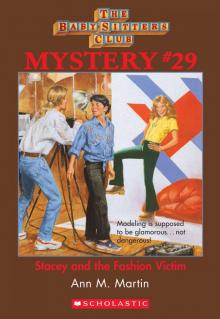 Stacey and the Fashion Victim
Stacey and the Fashion Victim Dawn Schafer, Undercover Baby-Sitter
Dawn Schafer, Undercover Baby-Sitter Karen's Tuba
Karen's Tuba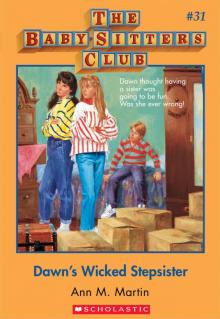 Dawn's Wicked Stepsister
Dawn's Wicked Stepsister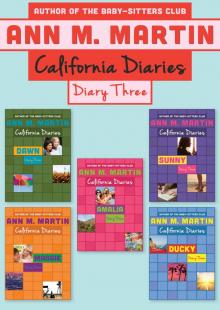 Diary Three: Dawn, Sunny, Maggie, Amalia, and Ducky
Diary Three: Dawn, Sunny, Maggie, Amalia, and Ducky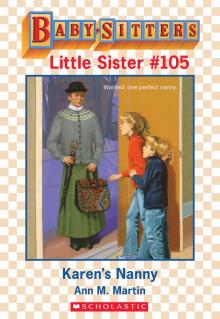 Karen's Nanny
Karen's Nanny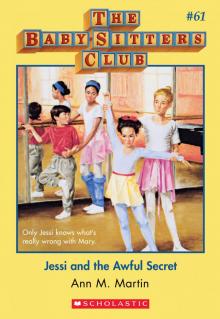 Jessi and the Awful Secret
Jessi and the Awful Secret Karen's New Year
Karen's New Year Karen's Candy
Karen's Candy Karen's President
Karen's President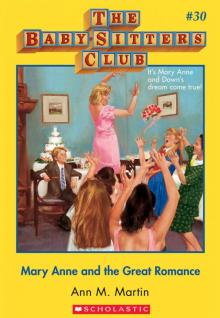 Mary Anne and the Great Romance
Mary Anne and the Great Romance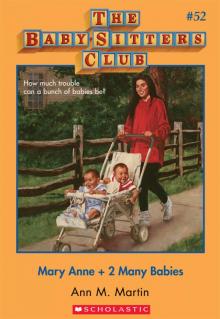 Mary Anne + 2 Many Babies
Mary Anne + 2 Many Babies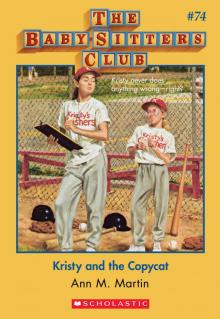 Kristy and the Copycat
Kristy and the Copycat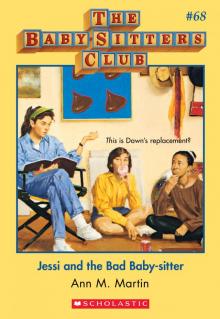 Jessi and the Bad Baby-Sitter
Jessi and the Bad Baby-Sitter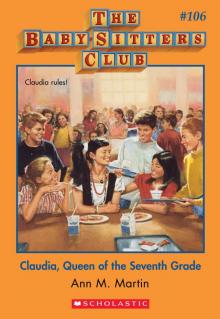 Claudia, Queen of the Seventh Grade
Claudia, Queen of the Seventh Grade Claudia and the Lighthouse Ghost
Claudia and the Lighthouse Ghost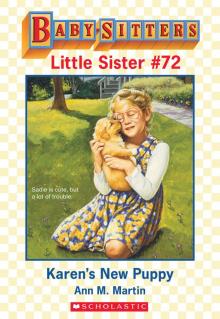 Karen's New Puppy
Karen's New Puppy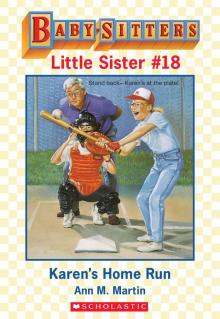 Karen's Home Run
Karen's Home Run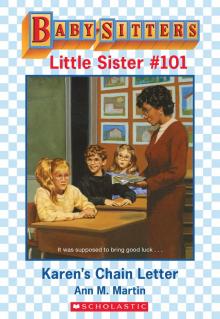 Karen's Chain Letter
Karen's Chain Letter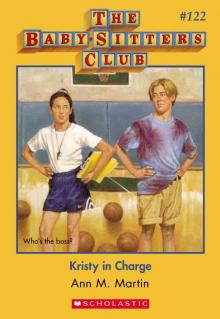 Kristy in Charge
Kristy in Charge Karen's Angel
Karen's Angel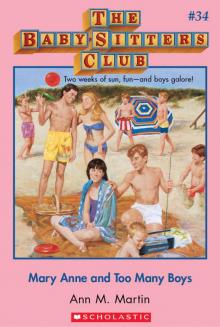 Mary Anne and Too Many Boys
Mary Anne and Too Many Boys Karen's Big Fight
Karen's Big Fight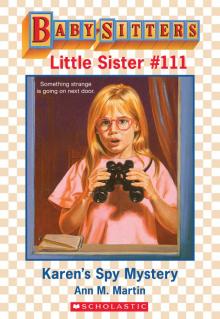 Karen's Spy Mystery
Karen's Spy Mystery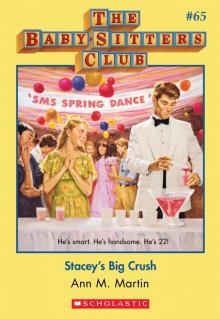 Stacey's Big Crush
Stacey's Big Crush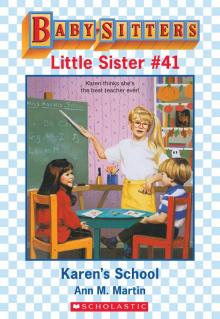 Karen's School
Karen's School Claudia and the Terrible Truth
Claudia and the Terrible Truth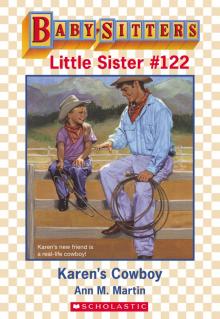 Karen's Cowboy
Karen's Cowboy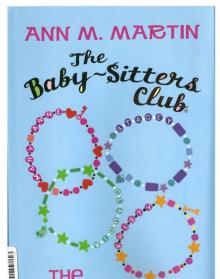 The Summer Before
The Summer Before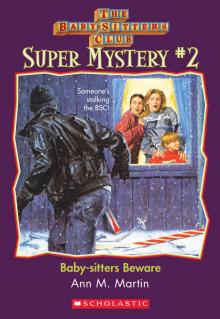 Beware, Dawn!
Beware, Dawn! Belle Teale
Belle Teale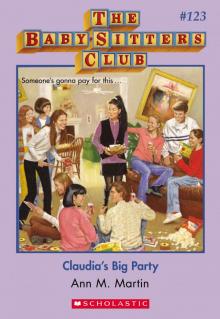 Claudia's Big Party
Claudia's Big Party The Secret Life of Mary Anne Spier
The Secret Life of Mary Anne Spier Karen's Book
Karen's Book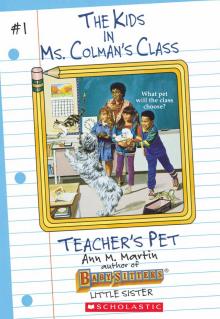 Teacher's Pet
Teacher's Pet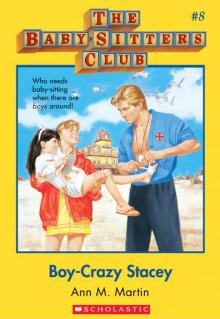 Boy-Crazy Stacey
Boy-Crazy Stacey Claudia and the Disaster Date
Claudia and the Disaster Date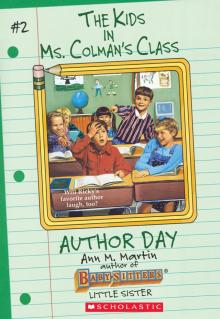 Author Day
Author Day Claudia and the Sad Good-Bye
Claudia and the Sad Good-Bye Kristy and the Worst Kid Ever
Kristy and the Worst Kid Ever Yours Turly, Shirley
Yours Turly, Shirley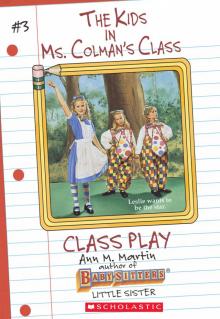 Class Play
Class Play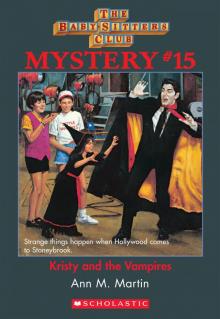 Kristy and the Vampires
Kristy and the Vampires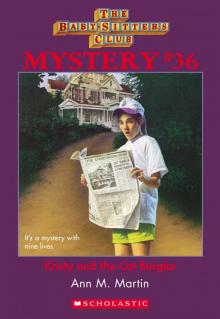 Kristy and the Cat Burglar
Kristy and the Cat Burglar Karen's Pumpkin Patch
Karen's Pumpkin Patch Stacey and the Mystery at the Empty House
Stacey and the Mystery at the Empty House Karen's Chicken Pox
Karen's Chicken Pox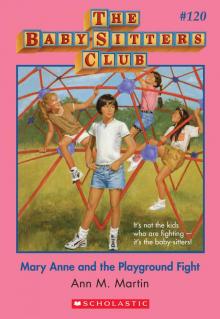 Mary Anne and the Playground Fight
Mary Anne and the Playground Fight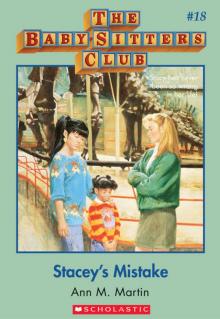 Stacey's Mistake
Stacey's Mistake Coming Apart
Coming Apart Mary Anne and the Little Princess
Mary Anne and the Little Princess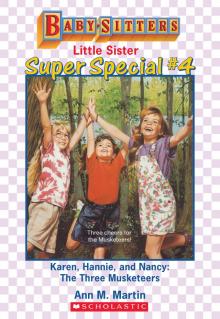 Karen, Hannie and Nancy: The Three Musketeers
Karen, Hannie and Nancy: The Three Musketeers 'Tis the Season
'Tis the Season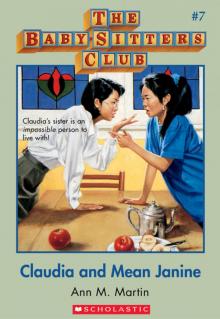 Claudia and Mean Janine
Claudia and Mean Janine Karen's School Bus
Karen's School Bus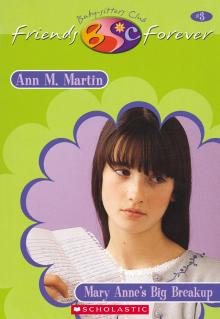 Mary Anne's Big Breakup
Mary Anne's Big Breakup Rain Reign
Rain Reign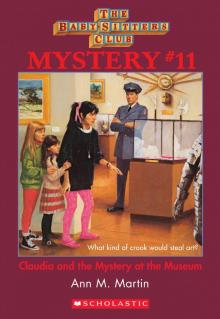 Claudia and the Mystery at the Museum
Claudia and the Mystery at the Museum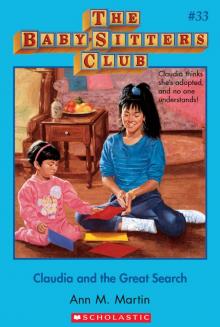 Claudia and the Great Search
Claudia and the Great Search Karen's Doll
Karen's Doll Shannon's Story
Shannon's Story Sea City, Here We Come!
Sea City, Here We Come!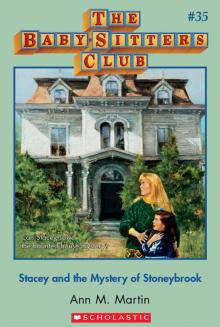 Stacey and the Mystery of Stoneybrook
Stacey and the Mystery of Stoneybrook Karen's Treasure
Karen's Treasure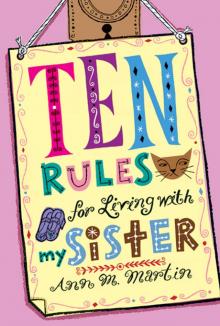 Ten Rules for Living With My Sister
Ten Rules for Living With My Sister With You and Without You
With You and Without You Baby-Sitters' Island Adventure
Baby-Sitters' Island Adventure Karen's Fishing Trip
Karen's Fishing Trip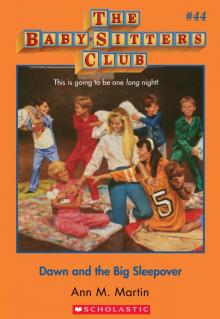 Dawn and the Big Sleepover
Dawn and the Big Sleepover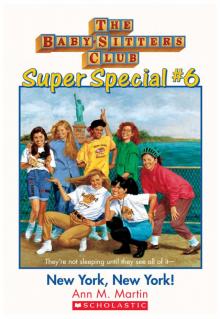 New York, New York!
New York, New York! Ten Kids, No Pets
Ten Kids, No Pets Happy Holidays, Jessi
Happy Holidays, Jessi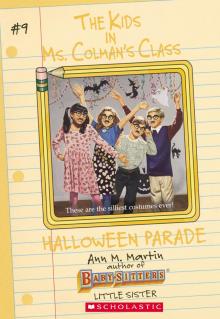 Halloween Parade
Halloween Parade Karen's New Holiday
Karen's New Holiday Kristy Power!
Kristy Power! Karen's Wish
Karen's Wish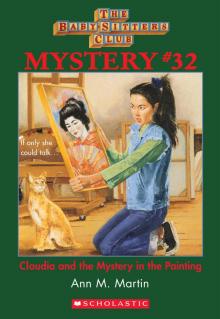 Claudia and the Mystery in the Painting
Claudia and the Mystery in the Painting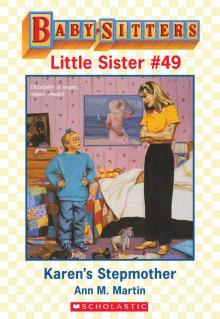 Karen's Stepmother
Karen's Stepmother Abby in Wonderland
Abby in Wonderland Karen's Snow Day
Karen's Snow Day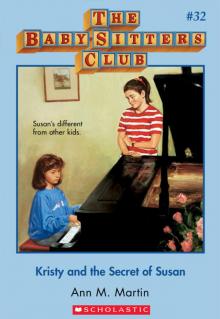 Kristy and the Secret of Susan
Kristy and the Secret of Susan Karen's Pony Camp
Karen's Pony Camp Karen's School Trip
Karen's School Trip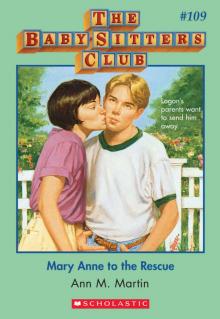 Mary Anne to the Rescue
Mary Anne to the Rescue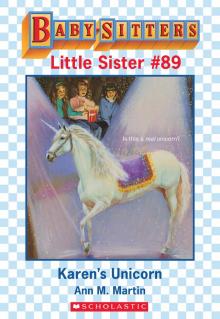 Karen's Unicorn
Karen's Unicorn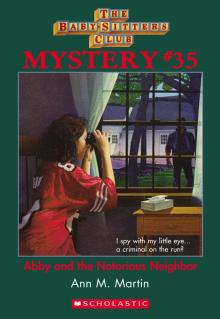 Abby and the Notorious Neighbor
Abby and the Notorious Neighbor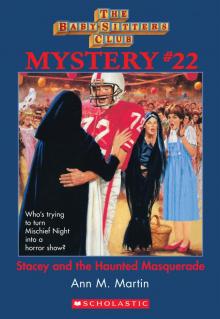 Stacey and the Haunted Masquerade
Stacey and the Haunted Masquerade Claudia Gets Her Guy
Claudia Gets Her Guy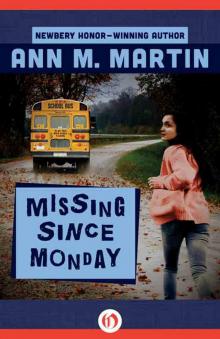 Missing Since Monday
Missing Since Monday Stacey's Choice
Stacey's Choice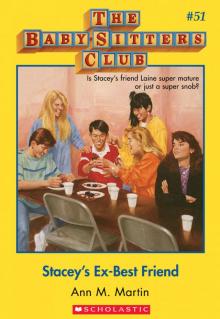 Stacey's Ex-Best Friend
Stacey's Ex-Best Friend Karen's New Teacher
Karen's New Teacher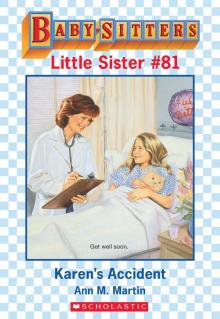 Karen's Accident
Karen's Accident Karen's Lucky Penny
Karen's Lucky Penny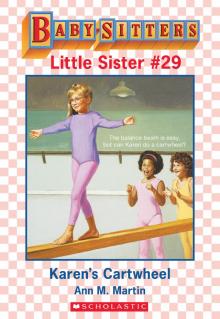 Karen's Cartwheel
Karen's Cartwheel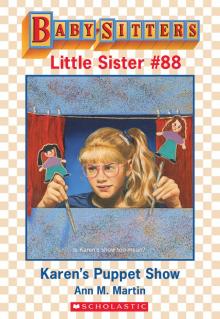 Karen's Puppet Show
Karen's Puppet Show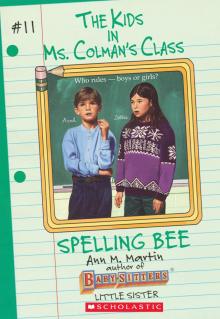 Spelling Bee
Spelling Bee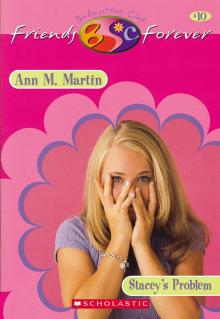 Stacey's Problem
Stacey's Problem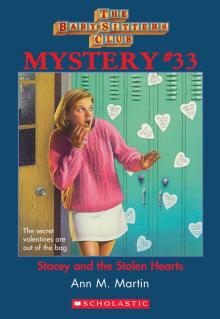 Stacey and the Stolen Hearts
Stacey and the Stolen Hearts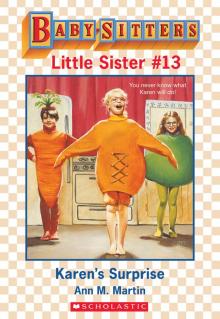 Karen's Surprise
Karen's Surprise Karen's Worst Day
Karen's Worst Day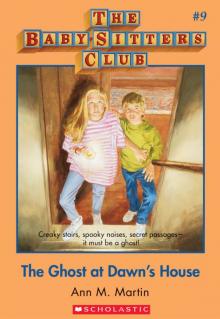 The Ghost at Dawn's House
The Ghost at Dawn's House Karen's Big Sister
Karen's Big Sister Karen's Easter Parade
Karen's Easter Parade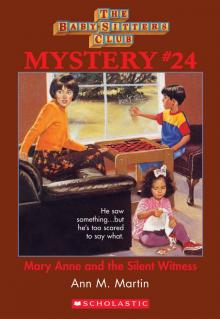 Mary Anne and the Silent Witness
Mary Anne and the Silent Witness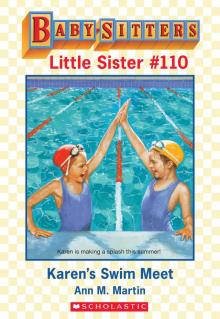 Karen's Swim Meet
Karen's Swim Meet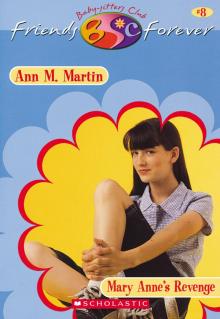 Mary Anne's Revenge
Mary Anne's Revenge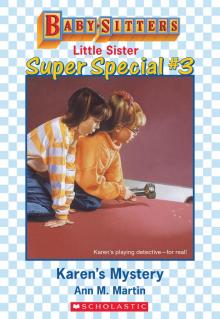 Karen's Mystery
Karen's Mystery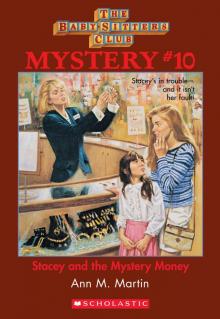 Stacey and the Mystery Money
Stacey and the Mystery Money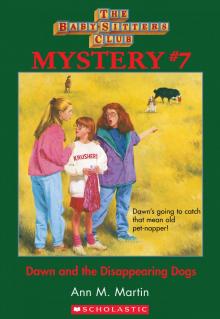 Dawn and the Disappearing Dogs
Dawn and the Disappearing Dogs Karen's Christmas Tree
Karen's Christmas Tree Welcome to Camden Falls
Welcome to Camden Falls Karen's Pilgrim
Karen's Pilgrim Dawn and the Halloween Mystery
Dawn and the Halloween Mystery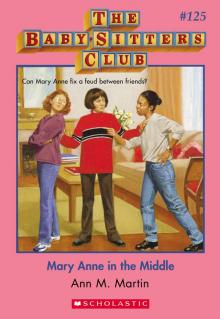 Mary Anne in the Middle
Mary Anne in the Middle Karen's Toys
Karen's Toys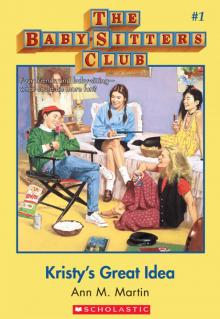 Kristy's Great Idea
Kristy's Great Idea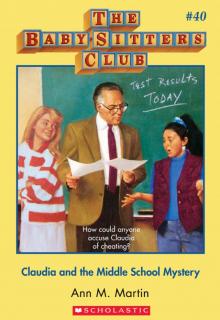 Claudia and the Middle School Mystery
Claudia and the Middle School Mystery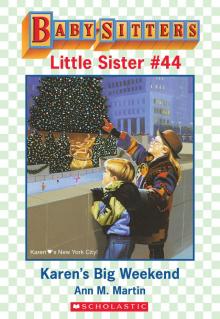 Karen's Big Weekend
Karen's Big Weekend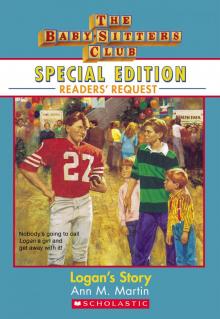 Logan's Story
Logan's Story Karen's Yo-Yo
Karen's Yo-Yo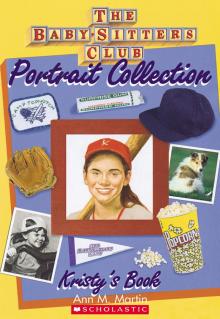 Kristy's Book
Kristy's Book Mallory and the Ghost Cat
Mallory and the Ghost Cat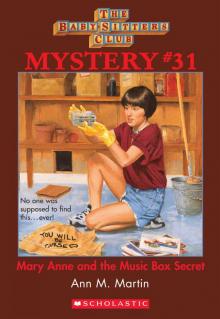 Mary Anne and the Music
Mary Anne and the Music Karen's Tattletale
Karen's Tattletale Karen's County Fair
Karen's County Fair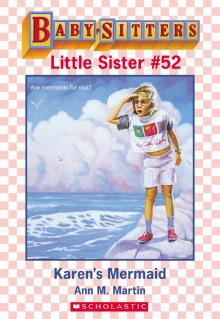 Karen's Mermaid
Karen's Mermaid Snowbound
Snowbound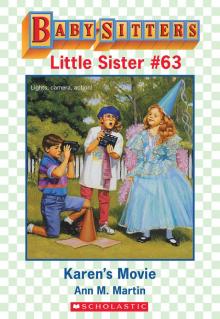 Karen's Movie
Karen's Movie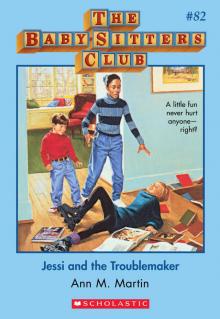 Jessi and the Troublemaker
Jessi and the Troublemaker Baby-Sitters at Shadow Lake
Baby-Sitters at Shadow Lake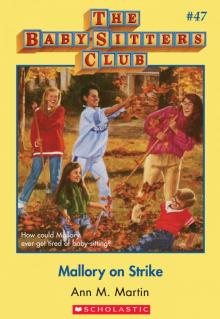 Mallory on Strike
Mallory on Strike Jessi's Baby-Sitter
Jessi's Baby-Sitter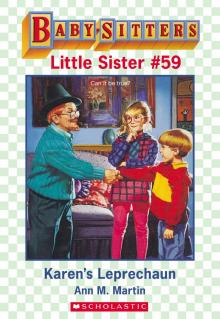 Karen's Leprechaun
Karen's Leprechaun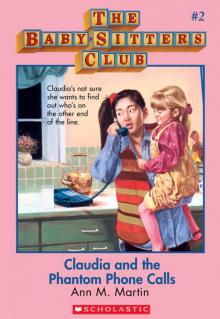 Claudia and the Phantom Phone Calls
Claudia and the Phantom Phone Calls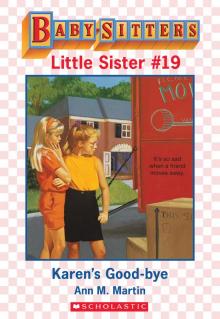 Karen's Good-Bye
Karen's Good-Bye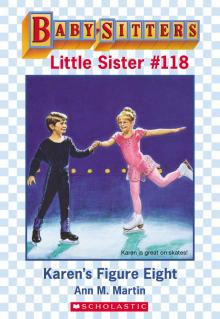 Karen's Figure Eight
Karen's Figure Eight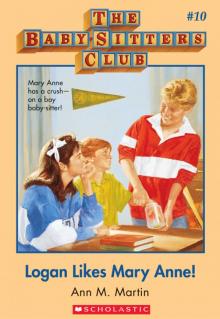 Logan Likes Mary Anne!
Logan Likes Mary Anne! Mary Anne and the Zoo Mystery
Mary Anne and the Zoo Mystery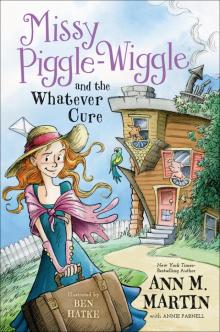 Missy Piggle-Wiggle and the Whatever Cure
Missy Piggle-Wiggle and the Whatever Cure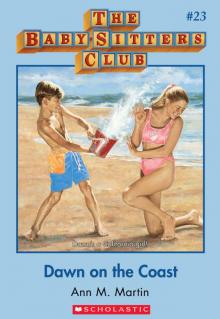 Dawn on the Coast
Dawn on the Coast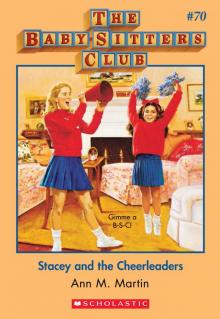 Stacey and the Cheerleaders
Stacey and the Cheerleaders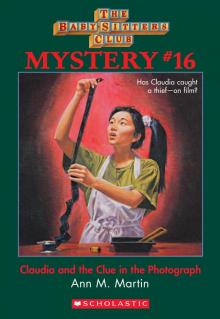 Claudia and the Clue in the Photograph
Claudia and the Clue in the Photograph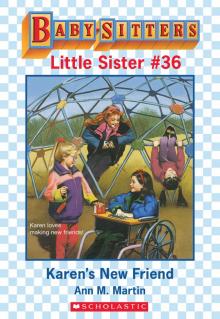 Karen's New Friend
Karen's New Friend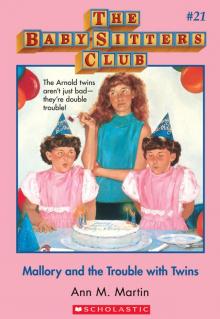 Mallory and the Trouble With Twins
Mallory and the Trouble With Twins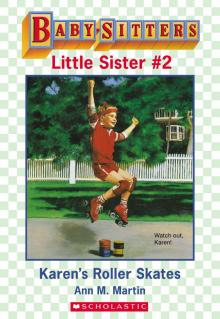 Karen's Roller Skates
Karen's Roller Skates Abby and the Best Kid Ever
Abby and the Best Kid Ever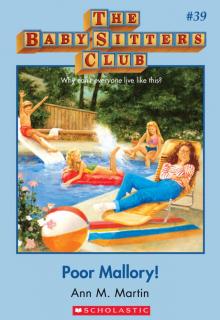 Poor Mallory!
Poor Mallory!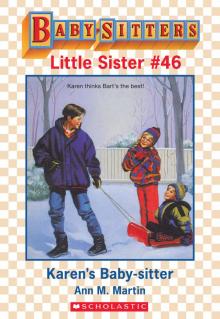 Karen's Witch
Karen's Witch Karen's Grandmothers
Karen's Grandmothers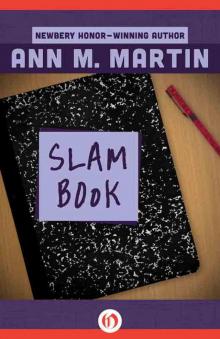 Slam Book
Slam Book Karen's School Picture
Karen's School Picture Karen's Reindeer
Karen's Reindeer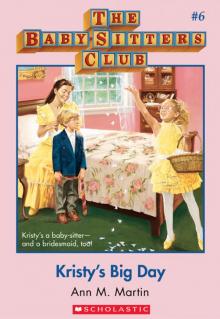 Kristy's Big Day
Kristy's Big Day The Long Way Home
The Long Way Home Karen's Sleigh Ride
Karen's Sleigh Ride On Christmas Eve
On Christmas Eve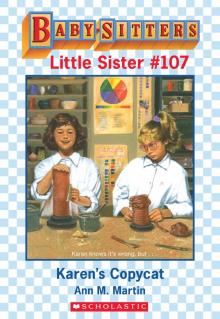 Karen's Copycat
Karen's Copycat Karen's Ice Skates
Karen's Ice Skates Claudia and the Little Liar
Claudia and the Little Liar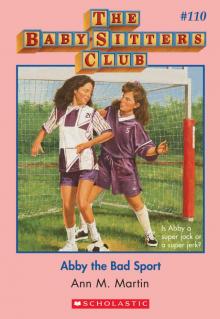 Abby the Bad Sport
Abby the Bad Sport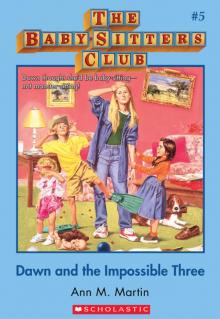 The Baby-Sitters Club #5: Dawn and the Impossible Three
The Baby-Sitters Club #5: Dawn and the Impossible Three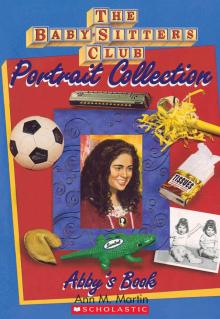 Abby's Book
Abby's Book Karen's Big Top
Karen's Big Top Main Street #8: Special Delivery
Main Street #8: Special Delivery Kristy and the Kidnapper
Kristy and the Kidnapper Karen's Ski Trip
Karen's Ski Trip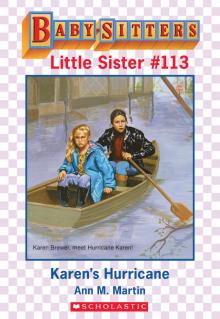 Karen's Hurricane
Karen's Hurricane Stacey and the Mystery at the Mall
Stacey and the Mystery at the Mall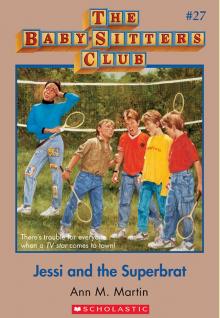 Jessi and the Superbrat
Jessi and the Superbrat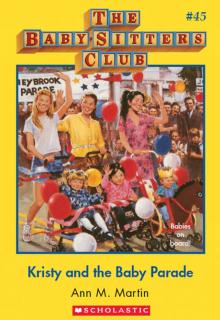 Kristy and the Baby Parade
Kristy and the Baby Parade Karen's New Bike
Karen's New Bike Karen's Big City Mystery
Karen's Big City Mystery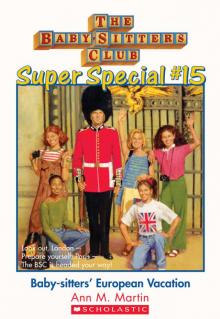 Baby-Sitters' European Vacation
Baby-Sitters' European Vacation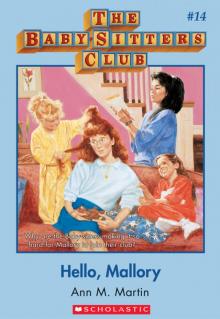 Hello, Mallory
Hello, Mallory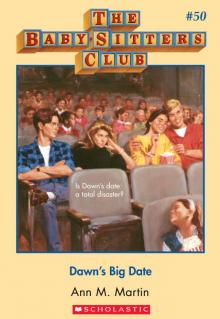 Dawn's Big Date
Dawn's Big Date Karen's Christmas Carol
Karen's Christmas Carol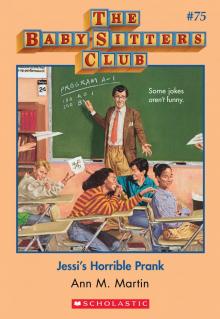 Jessi's Horrible Prank
Jessi's Horrible Prank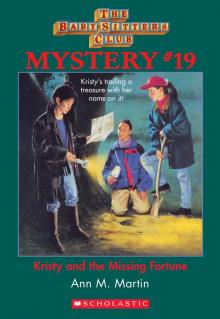 Kristy and the Missing Fortune
Kristy and the Missing Fortune Kristy and the Haunted Mansion
Kristy and the Haunted Mansion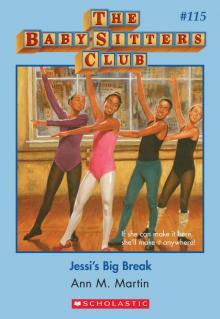 Jessi's Big Break
Jessi's Big Break Karen's Pony
Karen's Pony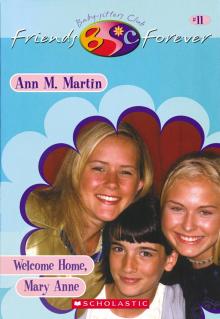 Welcome Home, Mary Anne
Welcome Home, Mary Anne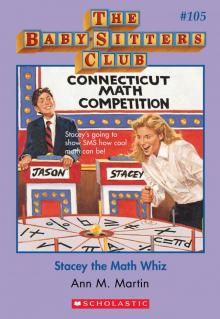 Stacey the Math Whiz
Stacey the Math Whiz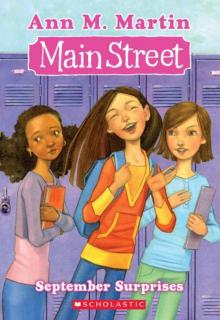 September Surprises
September Surprises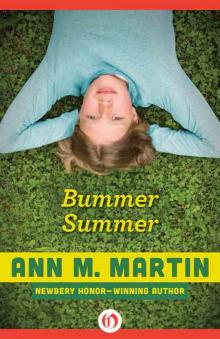 Bummer Summer
Bummer Summer Karen's Secret
Karen's Secret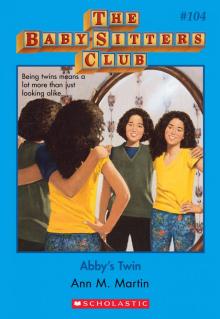 Abby's Twin
Abby's Twin Main Street #4: Best Friends
Main Street #4: Best Friends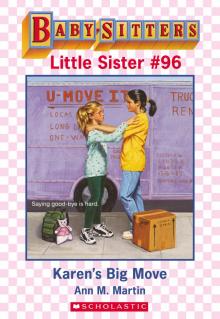 Karen's Big Move
Karen's Big Move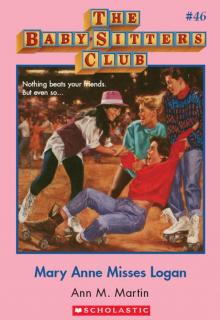 Mary Anne Misses Logan
Mary Anne Misses Logan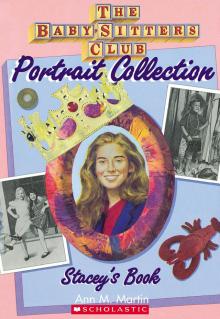 Stacey's Book
Stacey's Book Claudia and the Perfect Boy
Claudia and the Perfect Boy Holiday Time
Holiday Time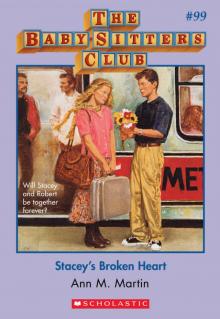 Stacey's Broken Heart
Stacey's Broken Heart Karen's Field Day
Karen's Field Day Kristy's Worst Idea
Kristy's Worst Idea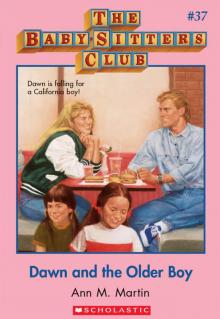 Dawn and the Older Boy
Dawn and the Older Boy Karen's Brothers
Karen's Brothers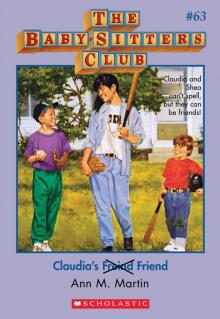 Claudia's Friend
Claudia's Friend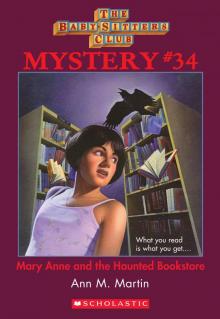 Mary Anne and the Haunted Bookstore
Mary Anne and the Haunted Bookstore Dawn and Whitney, Friends Forever
Dawn and Whitney, Friends Forever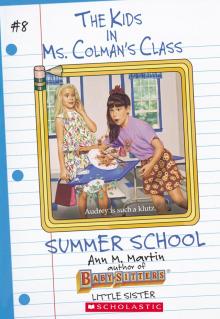 Summer School
Summer School Karen's Birthday
Karen's Birthday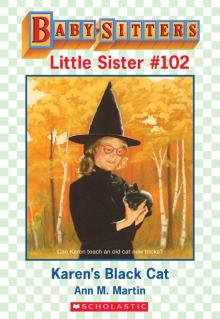 Karen's Black Cat
Karen's Black Cat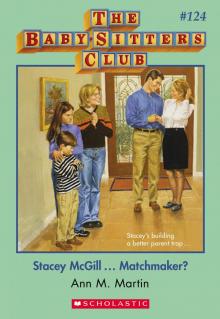 Stacey McGill... Matchmaker?
Stacey McGill... Matchmaker?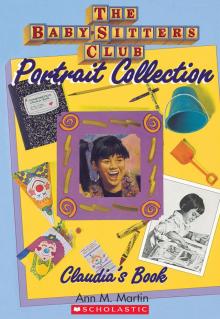 Claudia's Book
Claudia's Book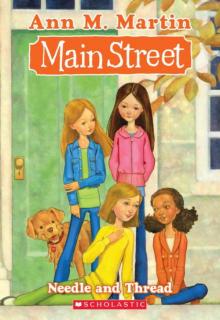 Main Street #2: Needle and Thread
Main Street #2: Needle and Thread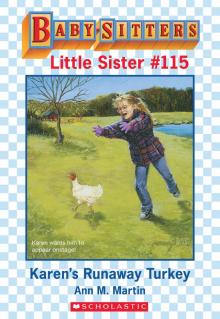 Karen's Runaway Turkey
Karen's Runaway Turkey Karen's Campout
Karen's Campout Karen's Bunny
Karen's Bunny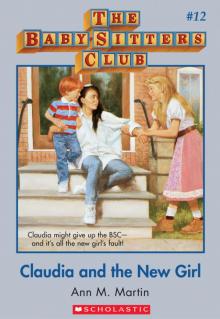 Claudia and the New Girl
Claudia and the New Girl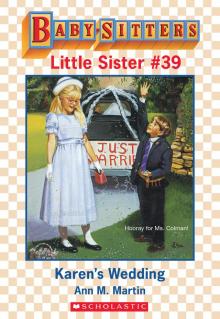 Karen's Wedding
Karen's Wedding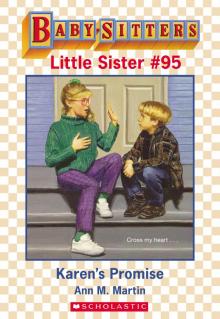 Karen's Promise
Karen's Promise Karen's Snow Princess
Karen's Snow Princess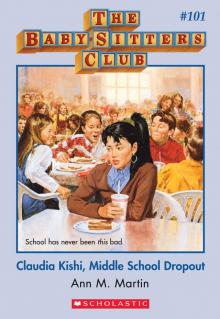 Claudia Kishi, Middle School Dropout
Claudia Kishi, Middle School Dropout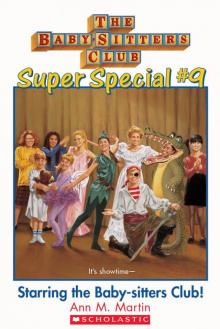 Starring the Baby-Sitters Club!
Starring the Baby-Sitters Club!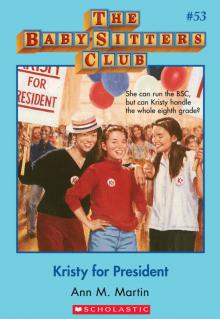 Kristy for President
Kristy for President California Girls!
California Girls!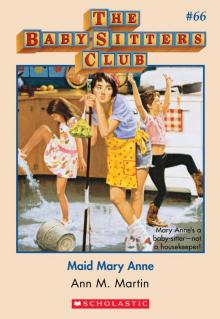 Maid Mary Anne
Maid Mary Anne Abby's Un-Valentine
Abby's Un-Valentine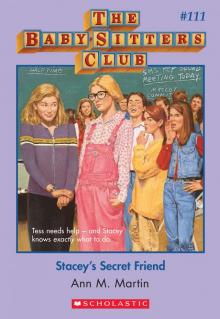 Stacey's Secret Friend
Stacey's Secret Friend Karen's Haunted House
Karen's Haunted House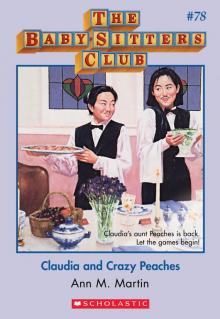 Claudia and Crazy Peaches
Claudia and Crazy Peaches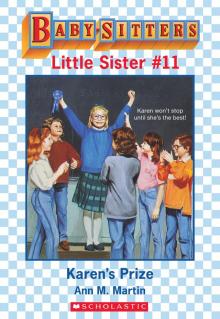 Karen's Prize
Karen's Prize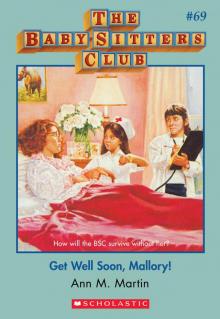 Get Well Soon, Mallory!
Get Well Soon, Mallory!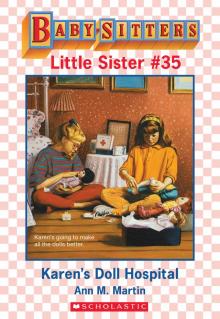 Karen's Doll Hospital
Karen's Doll Hospital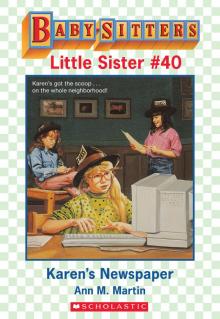 Karen's Newspaper
Karen's Newspaper Karen's Toothache
Karen's Toothache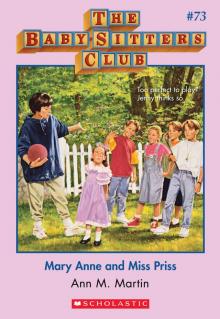 Mary Anne and Miss Priss
Mary Anne and Miss Priss Abby's Lucky Thirteen
Abby's Lucky Thirteen The Secret Book Club
The Secret Book Club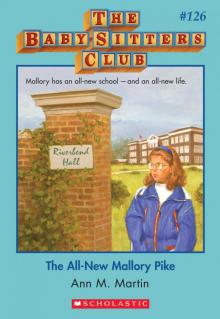 The All-New Mallory Pike
The All-New Mallory Pike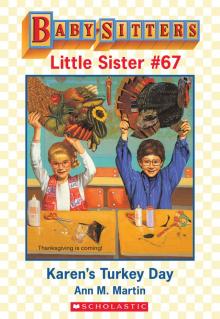 Karen's Turkey Day
Karen's Turkey Day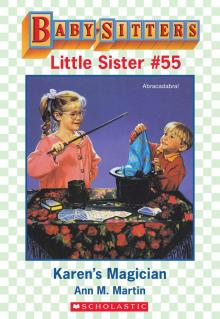 Karen's Magician
Karen's Magician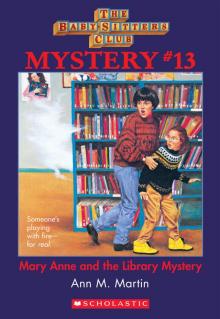 Mary Anne and the Library Mystery
Mary Anne and the Library Mystery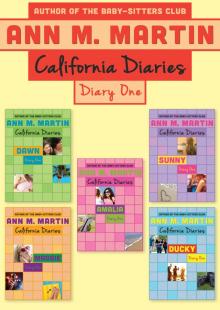 Diary One: Dawn, Sunny, Maggie, Amalia, and Ducky
Diary One: Dawn, Sunny, Maggie, Amalia, and Ducky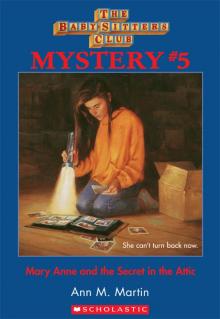 Mary Anne and the Secret in the Attic
Mary Anne and the Secret in the Attic Kristy and the Mother's Day Surprise
Kristy and the Mother's Day Surprise Karen's in Love
Karen's in Love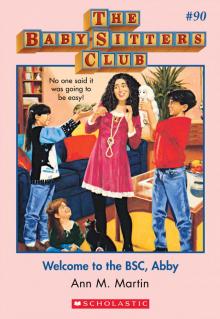 Welcome to the BSC, Abby
Welcome to the BSC, Abby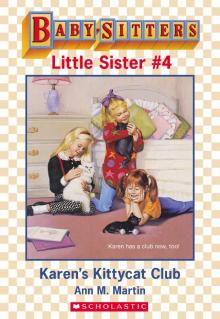 Karen's Kittycat Club
Karen's Kittycat Club The Mystery at Claudia's House
The Mystery at Claudia's House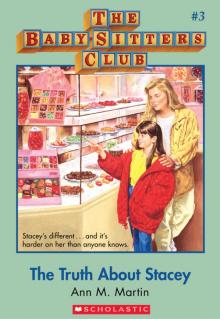 The Truth About Stacey
The Truth About Stacey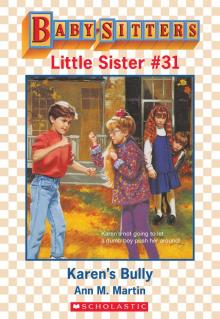 Karen's Bully
Karen's Bully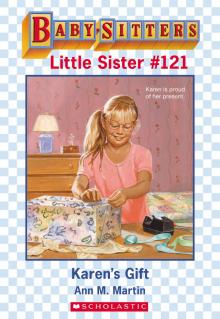 Karen's Gift
Karen's Gift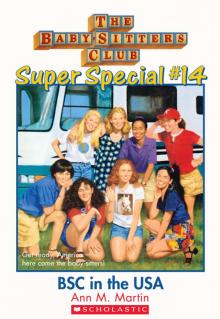 BSC in the USA
BSC in the USA Everything for a Dog
Everything for a Dog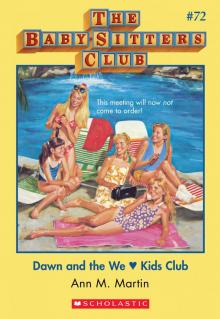 Dawn and the We Love Kids Club
Dawn and the We Love Kids Club Karen's Ghost
Karen's Ghost Stacey's Lie
Stacey's Lie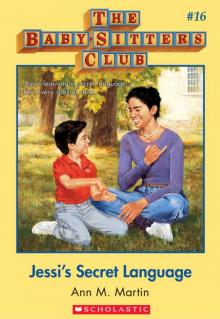 Jessi's Secret Language
Jessi's Secret Language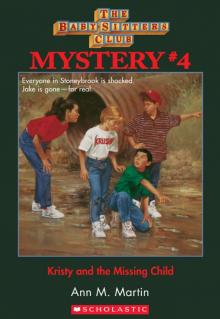 Kristy and the Missing Child
Kristy and the Missing Child Better to Wish
Better to Wish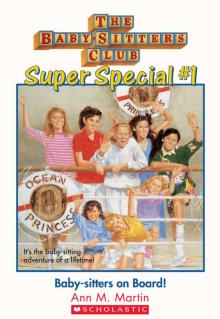 Baby-Sitters on Board!
Baby-Sitters on Board!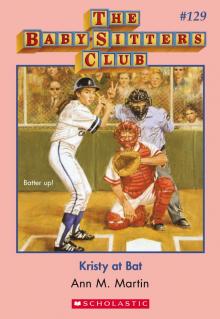 Kristy at Bat
Kristy at Bat Everything Changes
Everything Changes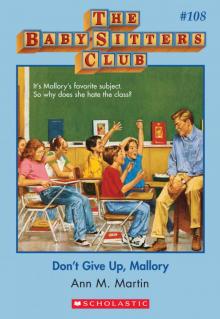 Don't Give Up, Mallory
Don't Give Up, Mallory A Dog's Life: The Autobiography of a Stray
A Dog's Life: The Autobiography of a Stray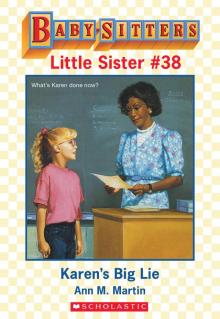 Karen's Big Lie
Karen's Big Lie Karen's Show and Share
Karen's Show and Share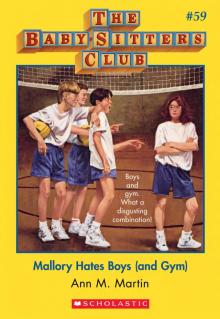 Mallory Hates Boys (and Gym)
Mallory Hates Boys (and Gym)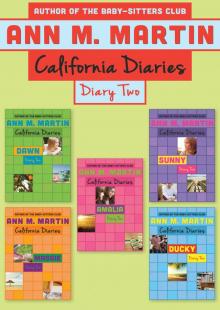 Diary Two: Dawn, Sunny, Maggie, Amalia, and Ducky
Diary Two: Dawn, Sunny, Maggie, Amalia, and Ducky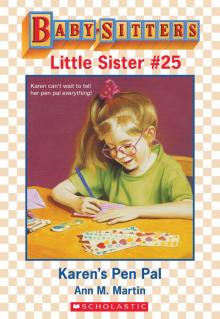 Karen's Pen Pal
Karen's Pen Pal Claudia and the Friendship Feud
Claudia and the Friendship Feud Karen's Secret Valentine
Karen's Secret Valentine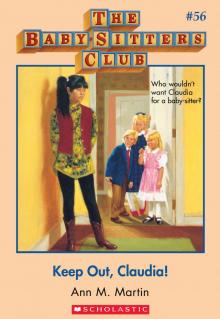 Keep Out, Claudia!
Keep Out, Claudia! Aloha, Baby-Sitters!
Aloha, Baby-Sitters!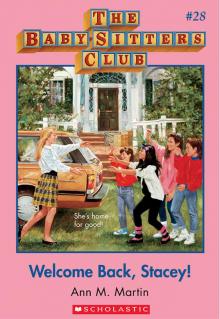 Welcome Back, Stacey
Welcome Back, Stacey Jessi Ramsey, Pet-Sitter
Jessi Ramsey, Pet-Sitter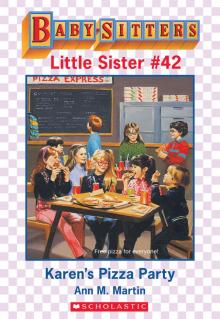 Karen's Pizza Party
Karen's Pizza Party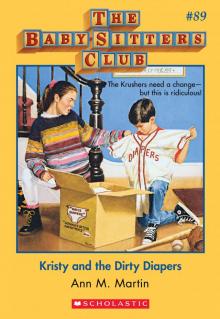 Kristy and the Dirty Diapers
Kristy and the Dirty Diapers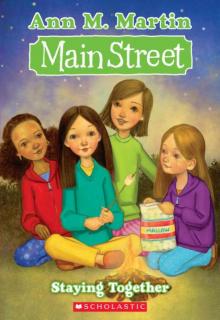 Staying Together
Staying Together Dawn and the Surfer Ghost
Dawn and the Surfer Ghost Claudia Makes Up Her Mind
Claudia Makes Up Her Mind Jessi's Gold Medal
Jessi's Gold Medal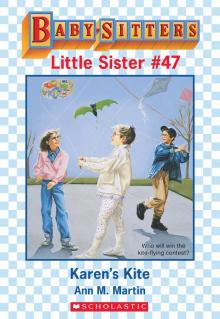 Karen's Kite
Karen's Kite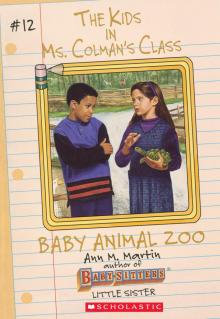 Baby Animal Zoo
Baby Animal Zoo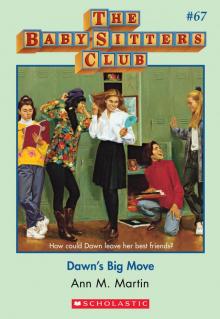 Dawn's Big Move
Dawn's Big Move Karen's Big Joke
Karen's Big Joke Karen's Lemonade Stand
Karen's Lemonade Stand Ma and Pa Dracula
Ma and Pa Dracula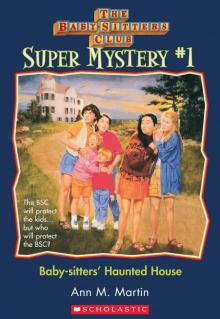 Baby-Sitters' Haunted House
Baby-Sitters' Haunted House Abby and the Mystery Baby
Abby and the Mystery Baby Home Is the Place
Home Is the Place Karen's Grandad
Karen's Grandad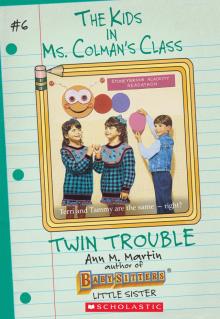 Twin Trouble
Twin Trouble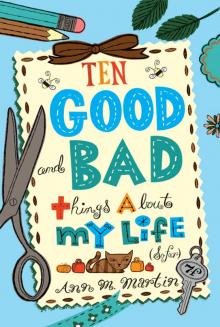 Ten Good and Bad Things About My Life (So Far)
Ten Good and Bad Things About My Life (So Far)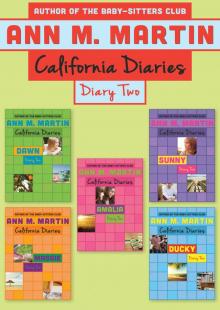 Diary Two
Diary Two Baby-Sitters Club 027
Baby-Sitters Club 027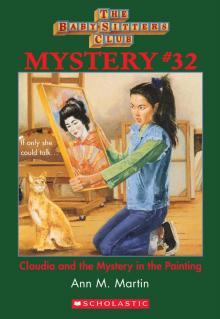 Claudia and the Mystery Painting
Claudia and the Mystery Painting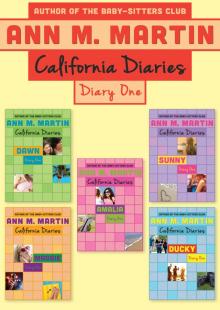 Diary One
Diary One Baby-Sitters Club 037
Baby-Sitters Club 037 Baby-Sitters Club 028
Baby-Sitters Club 028 Baby-Sitters Club 085
Baby-Sitters Club 085 Dawn Schaffer Undercover Baby-Sitter
Dawn Schaffer Undercover Baby-Sitter Jessi's Babysitter
Jessi's Babysitter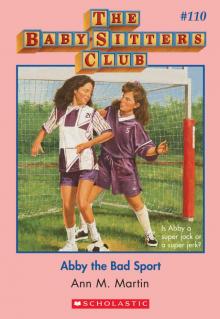 The Baby-Sitters Club #110: Abby the Bad Sport (Baby-Sitters Club, The)
The Baby-Sitters Club #110: Abby the Bad Sport (Baby-Sitters Club, The) Karen's Little Sister
Karen's Little Sister Baby-Sitters Club 058
Baby-Sitters Club 058 Claudia And The Genius On Elm St.
Claudia And The Genius On Elm St.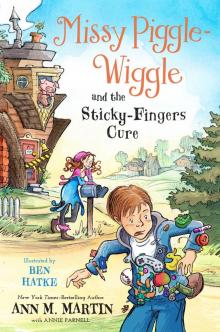 Missy Piggle-Wiggle and the Sticky-Fingers Cure
Missy Piggle-Wiggle and the Sticky-Fingers Cure Kristy and Kidnapper
Kristy and Kidnapper Baby-Sitters Club 041
Baby-Sitters Club 041 Karen's Bunny Trouble
Karen's Bunny Trouble Baby-Sitters Club 032
Baby-Sitters Club 032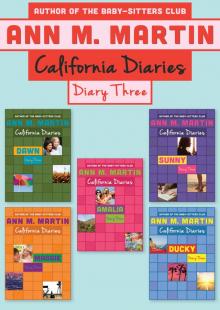 Diary Three
Diary Three Christmas Chiller
Christmas Chiller Karen's Half-Birthday
Karen's Half-Birthday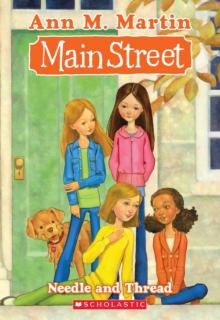 Needle and Thread
Needle and Thread Secret Life of Mary Anne Spier
Secret Life of Mary Anne Spier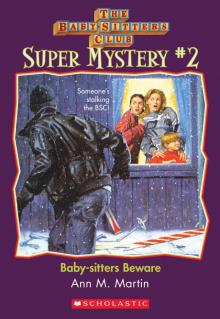 Baby-Sitters Beware
Baby-Sitters Beware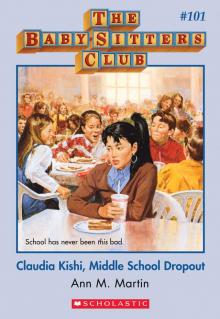 Claudia Kishi, Middle School Drop-Out
Claudia Kishi, Middle School Drop-Out Logan Likes Mary Anne !
Logan Likes Mary Anne ! Baby-Sitters Club 061
Baby-Sitters Club 061 Best Friends
Best Friends Baby-Sitters Club 031
Baby-Sitters Club 031 Karen's Little Witch
Karen's Little Witch Jessi Ramsey, Petsitter
Jessi Ramsey, Petsitter Baby-Sitters Club 123
Baby-Sitters Club 123 Baby-Sitters Club 059
Baby-Sitters Club 059 Baby-Sitters Club 033
Baby-Sitters Club 033 Baby-Sitters Club 060
Baby-Sitters Club 060 Baby-Sitters Club 094
Baby-Sitters Club 094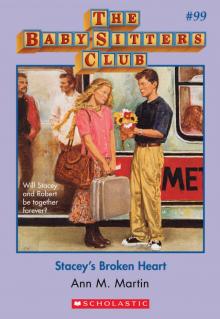 The Baby-Sitters Club #99: Stacey's Broken Heart
The Baby-Sitters Club #99: Stacey's Broken Heart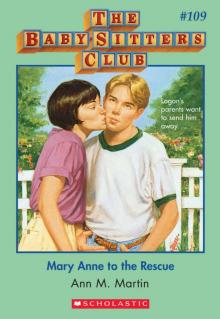 The Baby-Sitters Club #109: Mary Anne to the Rescue (Baby-Sitters Club, The)
The Baby-Sitters Club #109: Mary Anne to the Rescue (Baby-Sitters Club, The) Mystery At Claudia's House
Mystery At Claudia's House Claudia And The Sad Goodbye
Claudia And The Sad Goodbye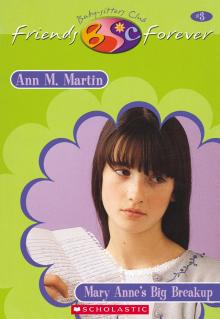 Mary Anne's Big Break-Up
Mary Anne's Big Break-Up Baby-Sitters Club 025
Baby-Sitters Club 025 Baby-Sitters Club 042
Baby-Sitters Club 042 Stacey and the Mystery of the Empty House
Stacey and the Mystery of the Empty House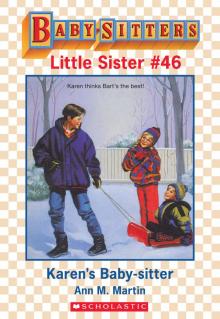 Karen's Baby-Sitter
Karen's Baby-Sitter Claudia's Friendship Feud
Claudia's Friendship Feud Baby-Sitters Club 090
Baby-Sitters Club 090 Baby-Sitters Club 021
Baby-Sitters Club 021 Baby-Sitters Club 056
Baby-Sitters Club 056 Baby-Sitters Club 040
Baby-Sitters Club 040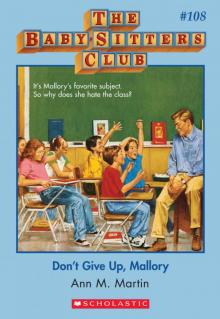 The Baby-Sitters Club #108: Don't Give Up, Mallory (Baby-Sitters Club, The)
The Baby-Sitters Club #108: Don't Give Up, Mallory (Baby-Sitters Club, The)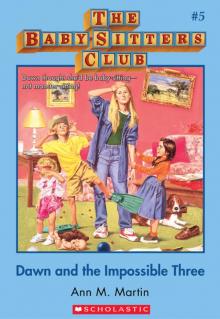 Dawn and the Impossible Three
Dawn and the Impossible Three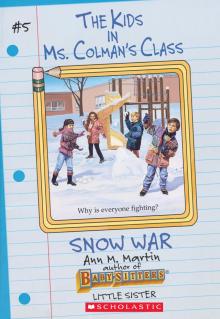 The Snow War
The Snow War Special Delivery
Special Delivery Baby-Sitters Club 057
Baby-Sitters Club 057 Mary Anne And Too Many Babies
Mary Anne And Too Many Babies Baby-Sitters Club 030
Baby-Sitters Club 030